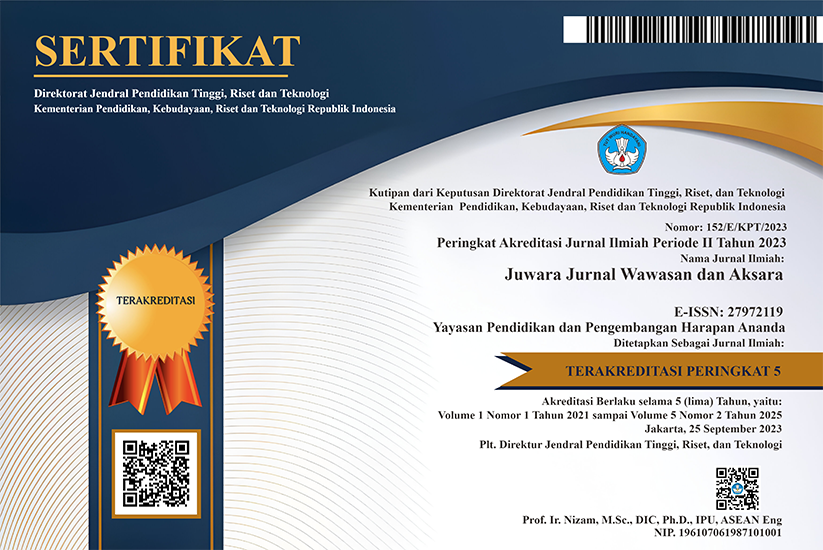Influence of Web Based Digital Media on Citizenship Literacy of Informatics Engineering Students
DOI:
https://doi.org/10.58740/juwara.v5i1.496Keywords:
citizenship literacy, digital media, informatics engineering, web based learningAbstract
The study aims to analyze the influence of the use of web-based digital learning media on increasing the citizenship literacy of Informatics Engineering students. Civic literacy is understood as a multidimensional competence that includes cognitive, affective, and participatory aspects in the life of the nation and state. The research method used a quantitative approach with a quasi-experimental design of a non-equivalent control group design. The study sample consisted of 58 students, divided into experimental (n=28) and control (n=30) groups. The experimental group received web-based learning over six meetings via a digital platform, while the control group followed conventional learning. The results of the analysis using the t-test showed a significant difference between the experimental group and the control group on the post-citizenship literacy test score (p < 0.001), with an effect size (Cohen's d) of 1.64 which showed a large influence. These findings suggest that web-based learning is effective in strengthening students' understanding and engagement with civic values. The implications of this study emphasize the importance of developing digital media in Citizenship learning to create a generation of critical, ethical, and participatory digital citizens.
References
Akcil, U., & Bastas, M. (2020). Examination of University Students’ Attitudes towards E-learning during the COVID-19 Pandemic Process and the Relationship of Digital Citizenship. Contemporary Educational Technology, 13(1), ep291. https://doi.org/10.30935/cedtech/9341
Al-Hasan, A., Yim, D., & Khuntia, J. (2020). Citizens’ Adherence to COVID-19 Mitigation Recommendations by the Government: A 3-Country Comparative Evaluation Using Web-Based Cross-Sectional Survey Data. Journal of Medical Internet Research, 22(8), e20634. https://doi.org/10.2196/20634
Alenezi, M. (2023). Digital Learning and Digital Institution in Higher Education. Education Sciences, 13(1), 88. https://doi.org/10.3390/educsci13010088
Çetin, E. (2021). Digital storytelling in teacher education and its effect on the digital literacy of pre-service teachers. Thinking Skills and Creativity, 39, 100760. https://doi.org/10.1016/j.tsc.2020.100760
Chen, L. L., Mirpuri, S., Rao, N., & Law, N. (2021). Conceptualization and measurement of digital citizenship across disciplines. Educational Research Review, 33, 100379. https://doi.org/10.1016/j.edurev.2021.100379
Choi, M., & Cristol, D. (2021). Digital citizenship with intersectionality lens: Towards participatory democracy driven digital citizenship education. Theory Into Practice, 60(4), 361–370. https://doi.org/10.1080/00405841.2021.1987094
Fernández-Prados, J. S., Lozano-Díaz, A., & Ainz-Galende, A. (2021). Measuring Digital Citizenship: A Comparative Analysis. Informatics, 8(1), 18. https://doi.org/10.3390/informatics8010018
Jackman, J. A., Gentile, D. A., Cho, N.-J., & Park, Y. (2021). Addressing the digital skills gap for future education. Nature Human Behaviour, 5(5), 542–545. https://doi.org/10.1038/s41562-021-01074-z
Johnston, N. (2020). The Shift towards Digital Literacy in Australian University Libraries: Developing a Digital Literacy Framework. Journal of the Australian Library and Information Association, 69(1), 93–101. https://doi.org/10.1080/24750158.2020.1712638
Lauricella, A. R., Herdzina, J., & Robb, M. (2020). Early childhood educators’ teaching of digital citizenship competencies. Computers & Education, 158, 103989. https://doi.org/10.1016/j.compedu.2020.103989
Martínez-Bravo, M. C., Sádaba Chalezquer, C., & Serrano-Puche, J. (2022). Dimensions of Digital Literacy in the 21st Century Competency Frameworks. Sustainability, 14(3), 1867. https://doi.org/10.3390/su14031867
Martzoukou, K., Fulton, C., Kostagiolas, P., & Lavranos, C. (2020). A study of higher education students’ self-perceived digital competences for learning and everyday life online participation. Journal of Documentation, 76(6), 1413–1458. https://doi.org/10.1108/JD-03-2020-0041
Martzoukou, K., Kostagiolas, P., Lavranos, C., Lauterbach, T., & Fulton, C. (2022). A study of university law students’ self-perceived digital competences. Journal of Librarianship and Information Science, 54(4), 751–769. https://doi.org/10.1177/09610006211048004
Möllers, N. (2021). Making Digital Territory: Cybersecurity, Techno-nationalism, and the Moral Boundaries of the State. Science, Technology, & Human Values, 46(1), 112–138. https://doi.org/10.1177/0162243920904436
Nababan, D., Wijayanti, A. P., Rico, Nashrallah, M. N., & Sari, W. A. S. (2023). Web-Based Learning Media for Distance Education: A Review. Jurnal Penelitian Pendidikan IPA, 9(12), 1342–1353. https://doi.org/10.29303/jppipa.v9i12.5827
Patrick, Melliano, K. T., Andriansyah, A., Warnars, H. L. H. S., & Moedjiono, S. (2023). The Web-Based History Learning Application for 6th-Grade Students (pp. 779–791). https://doi.org/10.1007/978-981-19-1844-5_62
Prasetiyo, W. H., Sumardjoko, B., Muhibbin, A., Mahadir Naidu, N. B., & Muthali’in, A. (2023). Promoting Digital Citizenship among Student-Teachers: The Role of Project-Based Learning in Improving Appropriate Online Behaviors. Participatory Educational Research, 10(1), 389–407. https://doi.org/10.17275/per.23.21.10.1
Puspita Dewi, D., Aeni, A. N., & Nugraha, R. G. (2023). Development of website-based learning media on the practice of pancasila on student learning motivation. Jurnal Cakrawala Pendas, 9(2), 250–261. https://doi.org/10.31949/jcp.v9i2.4735
Rizal, A., B., Irwandi, A., N., & Muhammad, A. F. (2025). Empowering Civic Engagement Through Digital Citizenship Education: A Cross-Cultural Perspective. Journal of Ecohumanism, 3(8). https://doi.org/10.62754/joe.v3i8.5721
Saing, S. A., & Santoso, G. (2023). Peran Budaya dan Bahasa Dalam Membentuk Identitas Dirinya Melalui Berkhebinekaan Global dan Creativity di Kelas 5. Jurnal Pendidikan Transformatif (JPT), 02(04), 595–610.
Tapingkae, P., Panjaburee, P., Hwang, G.-J., & Srisawasdi, N. (2020). Effects of a formative assessment-based contextual gaming approach on students’ digital citizenship behaviours, learning motivations, and perceptions. Computers & Education, 159, 103998. https://doi.org/10.1016/j.compedu.2020.103998
Widiyanto, A. (2021). The Effect of E-Learning as One of the Information Technology-Based Learning Media on Student Learning Motivation. IJIIS: International Journal of Informatics and Information Systems, 4(2), 123–129. https://doi.org/10.47738/ijiis.v4i2.108
Downloads
Published
How to Cite
Issue
Section
License
Copyright (c) 2025 Sumartono

This work is licensed under a Creative Commons Attribution-NonCommercial 4.0 International License.
JUWARA: Jurnal Wawasan dan Aksara provides open access to anyone so that the information and findings in these articles are useful for everyone. This journal's article content can be accessed and downloaded for free, following the creative commons license used.




















